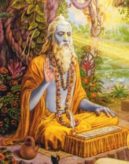Krishna Dvaipayana Vyasa
Vyasa (Sanskrit: व्यास), literally "Compiler") is also sometimes called Veda Vyāsa (वेदव्यास, veda-vyāsa, "the one who classified the Vedas") or Krishna Dvaipāyana (referring to his complexion and birthplace). He is generally considered the author of the Mahabharata, as well as a character in it. He is considered to be the scribe of both the Vedas and Puranas. According to the Vishnu Purana, there has been one Vyasa every Dvapara Yuga and in this Manvantara 28 Dvapara Yugas have gone by and as many Vyasas - all Avatars of Vishnu, including the last one Vyasa-Krishna Dvaipayana-had appeared to divide the Vedas. According to this Purana, Ashwatthaman, son of Drona, will be the 29th Ved Vyasa in the next Dvapara Yuga.
The festival of Guru Purnima is dedicated to him. It is also known as Vyasa Purnima, for it is the day believed to be both his birthday and the day he divided the Vedas.
Vyasa appears for the first time as the compiler of, and an important character in, the Mahabharata. It is said that he was the expansion of the god Vishnu who came in Dvapara Yuga to make all the Vedic knowledge available in written form which was available in spoken form at that time. He was the son of Satyavati, daughter of Vasu Uparichara and the adopted daughter of the fisherman Dasharaj, and sage Parashara (who is credited with being the author of the first Purana: Vishnu Purana), son of sage Vasishtha.
Vyasawas born on an island in the river Yamuna river near Kalpi, Uttar Pradesh, India. Vyasa is believed to have lived on the banks of Ganga in modern-day Uttarakhand. The place was also the abode of sage Vasishta, the great grandfather of Vyasa. Vyasa was dark-complexioned and hence was called by the name Krishna, and also the name Dwaipayana, meaning 'island-born'. Dhritarashtra born of Ambika, and Pandu, born of Ambalika and Vidura born to a maid, were born from Vyasa's powers (Siddhis).
Vyasa's father Parashara was a great Rishi and one of the supreme authorities on astrology and his book Parashara Hora is still a textbook on astrology. He has also written a Smriti known as Parashara Smriti which is held in such high esteem that it is quoted by our present-day writers on sociology and ethics. Parashara came to know that a child, conceived at a particular Ghatika or moment of time, would be born as the greatest man of the age, nay, as an Amsa of Lord Vishnu Himself. On that day, Parashara was travelling in a boat and he spoke to the boatman about the nearing of that auspicious time. The boatman had a daughter who was of age and awaiting marriage. He was impressed with the sanctity and greatness of the Rishi and offered his daughter in marriage to Parashara. Our Vyasa was born of this union and his birth is said to be due to the blessing of Lord Shiva Himself who blessed the union of a sage with a Jnani of the highest order, although of a low caste.
At a very tender age Vyasa gave out to his parents the secret of his life that he should go to the forest and do un-broken Tapas. His mother at first did not agree, but later gave permission on one important condition that he should appear before her whenever she wished for his presence. Puranas say that Vyasa took initiation at the hands of his twenty-first Guru, sage Vasudeva. He studied the Shastras under sages Sanaka and Sananda and others. He arranged the Vedas for the good of mankind and wrote the Brahma Sutras for the quick and easy understanding of the Srutis; he also wrote the Mahabharata to enable humans to understand the highest knowledge in the easiest way. Vyasa wrote the eighteen Puranas and established the system of teaching them through Upakhyanas or discourses. In this way, he established the three paths, viz., Karma, Upasana and Jnana. To him is also attributed the fact that he continued the line of his mother and that Dhritarashtra, Pandu and Vidura were his progeny. Vyasa's last work was the Bhagavata which he undertook at the instigation of Devarshi Narada who once came to him and advised him to write it as, without it, his goal in life would not be reached.
Vyasa is considered by all Hindus as a Chiranjivi, one who is still living and roaming throughout the world for the well-being of his devotees. It is said that he appears to the true and the faithful and that Jagadguru Sankaracharya had his Darshan in the house of sage Mandana Misra and that he appeared to many others as well. Thus, in short, Vyasa lives for the welfare of the world.
